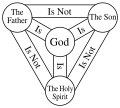Monotheism
Monotheism is the belief in one God or deity, in contrast to polytheism, which is the belief in many gods, and atheism, which is the absence of belief in any gods. Monotheism is a significant concept in many world religions, including Judaism, Christianity, and Islam.
Origins[edit]
The origins of monotheism are debated. Some scholars believe that monotheism developed out of polytheism, as societies gradually came to worship one god above all others. Others argue that monotheism is a more recent development, arising in the first millennium BCE in the Middle East.
Monotheism in Different Religions[edit]
Judaism[edit]
Judaism is often considered the first monotheistic religion. The Jewish belief in one God is expressed in the Shema Yisrael, a prayer that declares, "Hear, O Israel: the Lord our God, the Lord is one."
Christianity[edit]
Christianity is a monotheistic religion that believes in one God in three persons: the Father, Son, and Holy Spirit. This concept is unique to Christianity and distinguishes it from other monotheistic religions.
Islam[edit]
Islam is a monotheistic religion that believes in one God, Allah, who is merciful and compassionate. The Islamic declaration of faith, the Shahada, states, "There is no god but Allah, and Muhammad is his prophet."
Criticisms and Controversies[edit]
Monotheism has been criticized for promoting exclusivity and intolerance, as it often claims that there is only one true God and one true religion. However, many monotheists argue that their belief in one God promotes unity and equality.
See Also[edit]
References[edit]
<references />
|
|
|
-
Oromo Irrecha
-
La salle d'Akhenaton
-
Vishnu Vishvarupa
-
Sikh Temple Manning Drive Edmonton Alberta Canada
-
Ek Onkar
-
Tian bronze shang
-
House of Worship Germany 2007
-
Shield Trinity Scutum Fidei English
-
Michelangelo Creation of Adam
-
Allah
Ad. Transform your life with W8MD's Budget GLP-1 injections from $75


W8MD offers a medical weight loss program to lose weight in Philadelphia. Our physician-supervised medical weight loss provides:
- Weight loss injections in NYC (generic and brand names):
- Zepbound / Mounjaro, Wegovy / Ozempic, Saxenda
- Most insurances accepted or discounted self-pay rates. We will obtain insurance prior authorizations if needed.
- Generic GLP1 weight loss injections from $75 for the starting dose.
- Also offer prescription weight loss medications including Phentermine, Qsymia, Diethylpropion, Contrave etc.
NYC weight loss doctor appointmentsNYC weight loss doctor appointments
Start your NYC weight loss journey today at our NYC medical weight loss and Philadelphia medical weight loss clinics.
- Call 718-946-5500 to lose weight in NYC or for medical weight loss in Philadelphia 215-676-2334.
- Tags:NYC medical weight loss, Philadelphia lose weight Zepbound NYC, Budget GLP1 weight loss injections, Wegovy Philadelphia, Wegovy NYC, Philadelphia medical weight loss, Brookly weight loss and Wegovy NYC
|
WikiMD's Wellness Encyclopedia |
| Let Food Be Thy Medicine Medicine Thy Food - Hippocrates |
Medical Disclaimer: WikiMD is not a substitute for professional medical advice. The information on WikiMD is provided as an information resource only, may be incorrect, outdated or misleading, and is not to be used or relied on for any diagnostic or treatment purposes. Please consult your health care provider before making any healthcare decisions or for guidance about a specific medical condition. WikiMD expressly disclaims responsibility, and shall have no liability, for any damages, loss, injury, or liability whatsoever suffered as a result of your reliance on the information contained in this site. By visiting this site you agree to the foregoing terms and conditions, which may from time to time be changed or supplemented by WikiMD. If you do not agree to the foregoing terms and conditions, you should not enter or use this site. See full disclaimer.
Credits:Most images are courtesy of Wikimedia commons, and templates, categories Wikipedia, licensed under CC BY SA or similar.
Translate this page: - East Asian
中文,
日本,
한국어,
South Asian
हिन्दी,
தமிழ்,
తెలుగు,
Urdu,
ಕನ್ನಡ,
Southeast Asian
Indonesian,
Vietnamese,
Thai,
မြန်မာဘာသာ,
বাংলা
European
español,
Deutsch,
français,
Greek,
português do Brasil,
polski,
română,
русский,
Nederlands,
norsk,
svenska,
suomi,
Italian
Middle Eastern & African
عربى,
Turkish,
Persian,
Hebrew,
Afrikaans,
isiZulu,
Kiswahili,
Other
Bulgarian,
Hungarian,
Czech,
Swedish,
മലയാളം,
मराठी,
ਪੰਜਾਬੀ,
ગુજરાતી,
Portuguese,
Ukrainian












